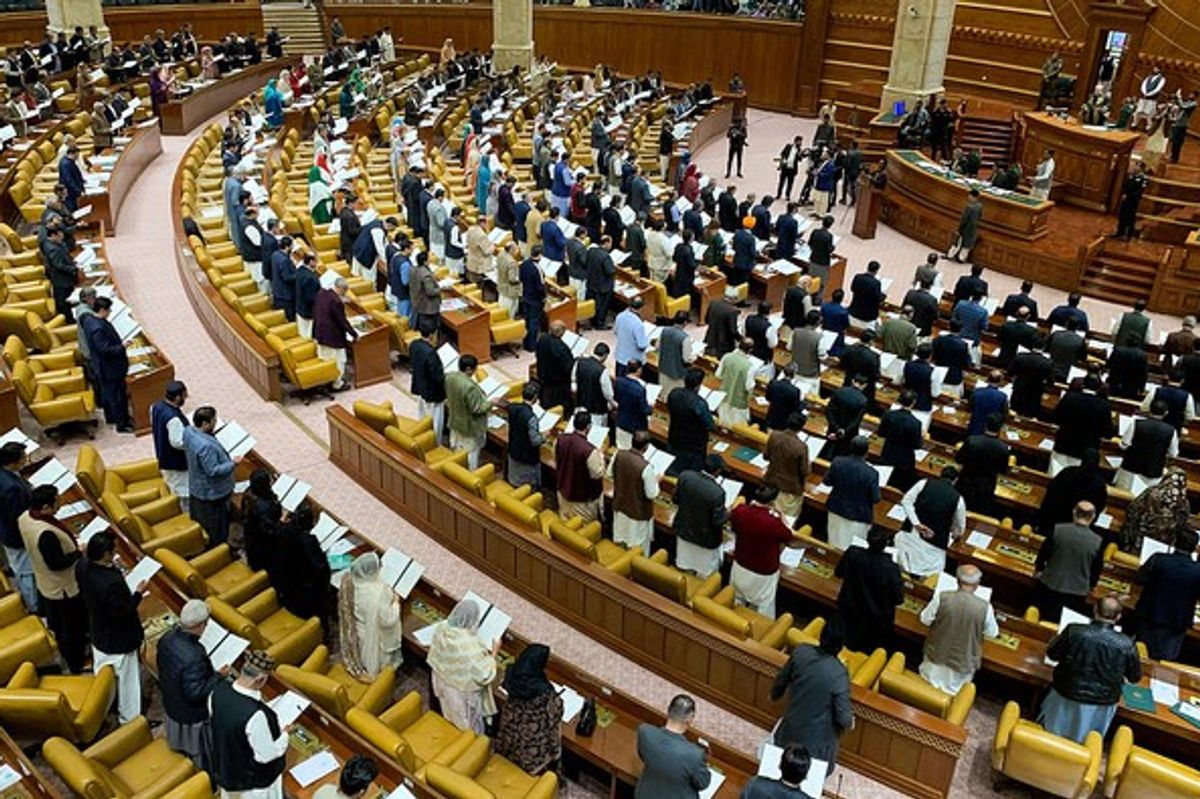Pakistan's Punjab Assembly passes contested bill critics say hides govt’s self-promotion spending
The bill, which regulates public information campaigns, has drawn opposition criticism for allegedly curbing the public’s right to question government ad spending

Laiba Zainab
Correspondent
Laiba Zainab is an award-winning journalist with nearly a decade of experience in digital media. She has received the DW & CEJ-IBA Data Journalism Award and the top digital media prize at the National Media Fellowship. At NUKTA, she covers underreported stories on health, crime, and social justice.

The legislative assembly in Pakistan's Punjab province on Monday passed the Punjab Public Awareness and Dissemination of Information Bill 2025, triggering a fiery debate between government and opposition members over its implications on transparency, media freedom, and the use of public funds for advertisement campaigns.
The bill, aimed at regulating the dissemination of public information through various media platforms, has been widely criticized by opposition members, who claim it restricts the public's right to question government spending on advertisements and promotional campaigns.
Punjab Information Minister Azma Bokhari moved the bill, and in a sharp counter, opposition leader Malik Ahmad Khan Bhachar declared the bill a “direct violation of fundamental rights.”
He argued it would shield the government from accountability and prevent journalists and citizens from asking how much public money is spent on advertisements and self-promotion.
He further criticized the bill's retrospective application from January 2024, terming it a “convenient move” to legitimize past government ad campaigns. “This bill benefits the sitting government and no one else,” Bhachar said, warning it opens the door to media manipulation. “They can run any campaign -- true or false -- by purchasing media platforms.”
Bhachar also questioned the democratic intent behind the legislation. “Governments with genuine mandates don’t feel the need to pass such bills,” he remarked.
Azma defended the bill, calling the opposition’s criticism “baseless and detached from reality.” She asserted that the objections were rooted in fake posts and misinformation, not facts. “We cannot shape policy based on fabricated social media content,” she said.
Rejecting allegations of political propaganda, Bokhari emphasized the distinction between “political publicity and social awareness.”
She argued that government initiatives -- such as housing schemes -- deserved visibility and that the state had a duty to inform the public through legitimate channels. “We cannot send out drummers or hang messages around pigeons’ necks,” she said. “This bill ensures effective communication with the people.”
While talking to Nukta, the provincial information minister said, “It is a simple awareness and dissemination bill which defines the mode of awareness, we will decide how we will disseminate,” while adding, “We are the executive, and it is our prerogative where we spend the funds.”
Despite the strong pushback, the treasury benches prevailed, and the bill was passed by a majority vote.
Bhachar, while commenting on the hastily passage of the bill, said, “It is another form of defamation bill. The way they have passed all the bills today has never been done this way. Public awareness bill is for the awareness of the public, or to shut them down?”
Provincial lawmakers react
Punjab’s Education Minister, Rana Sikander Hayat, argued that the majority is the authority, “We always as a party have believed in the right to information. Anything is passed with a majority in parliament, the opposition’s arguments were heard in the lengthy session that I was a part of, and whatever majority decides is the decision.”
Shoaib Ameer Awan, while criticizing the bill, said, “It is just to get their pictures printed on the advertisement, so no one can ask them, which is why they did this and it was not needed at all.”
Muhammad Nadeem Qureshi called it a draconian law, “Pakistan’s Constitution gives everyone freedom of expression. These people are afraid of public reaction. They brought defamation law, PECA, 26th Amendment; these are all those black laws which will always be attributed to them.”
He further added, “The type of law-making they are doing, they want a law like North Korea where they are a single party, no one can hold them accountable, no one questions them, and they won’t be answerable to anyone.”
Salient features of the bill
- The bill empowers the Punjab government and public bodies to run public awareness campaigns about government-funded projects, policies, programs, and initiatives.
- Campaigns can be conducted through TV, print, radio, cinema, billboards, and digital platforms.
- Allows the engagement of public figures such as celebrities, scholars, or sportspersons to promote awareness.
- Content of campaigns must relate strictly to public projects and may include details like the project's purpose, proponents, funding source, cost, and timelines.
- Grants the government the authority to name or rename public projects.
- The Director General of Public Relations is responsible for executing campaigns via pre-qualified advertising agencies under the Information and Culture Department.
- Provides a complaint mechanism: individuals may file complaints with the director general and appeal to the secretary; the Secretary’s decision is final.
- Civil courts have no jurisdiction under the Act; it overrides all existing laws and court rulings.
- Applies retrospectively from January 1, 2024, validating all government awareness campaigns since then.
- Includes indemnity for officials acting in good faith while implementing the Act.
- Authorizes the government to issue orders to address any implementation difficulties.







Comments
See what people are discussing